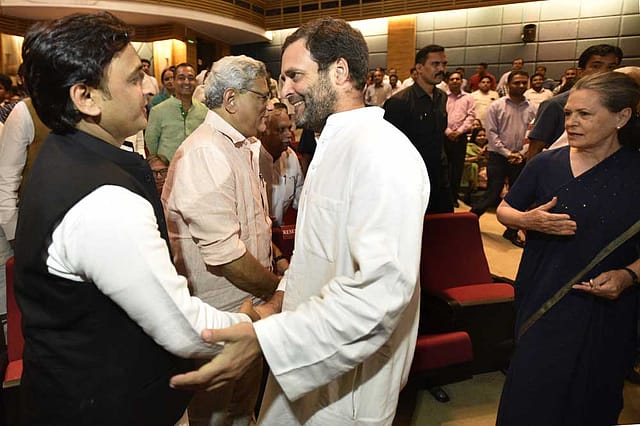Congress, SP, BSP in Seat-Sharing Talks in UP for 2019 Elections

Congress president Sonia Gandhi is in advanced talks with the Samajwadi Party (SP) and the Bahujan Samaj Party (BSP), two bitter rivals, to forge a grand electoral alliance against the Bharatiya Janata Party (BJP) to take on the might of the Narendra Modi-led poll blitz in the next general election in 2019. Uttar Pradesh, where the SP and the BSP have ruled by turns for a couple of decades, sends 80 members to the 543-member Lok Sabha, the largest by a single state.
According to at least three people close to the matter, a "broad understanding" has emerged on a seat-sharing formula. Former Uttar Pradesh chief ministers Akhilesh Yadav of SP and Mayawati of the BSP have "in principle" agreed to contest from 30 Lok Sabha seats each while the Congress would field candidates from the rest 20 seats from the country's most populous state. "Rivals like SP and the BSP have realized that unless they join hands they would be wiped out in the dog-eat-dog world of Uttar Pradesh politics where a once dominant Congress was decimated following the emergence of Mandal politics in the 1990s," said an SP leader in the know.
Another person close to the negotiations told Open that the seat-sharing is yet to be finalized with the SP "occasionally" demanding a larger share of 35 seats instead of 30. "Despite such hiccups, the Congress leadership seems very optimistic about the progress of the talks especially with a larger clarity surfacing among all the stakeholders, including an otherwise egotistical Mayawati, that unless they come together, there is no way they can fight the BJP at any level of government in the state," a Congress functionary who has closely followed the parleys among top-level leaders of the three parties said. According to Congress sources, Sonia Gandhi herself took the initiative to speak to Akhilesh and also to a point person of BSP chief Mayawati in a bid to thrash out a plan to build a consensus and a united front against the BJP in the state where the ruling party at the Centre has gained enormously in the 2014 Lok Sabha elections and in the 2017 assembly elections. In 2014, the BJP and its ally Apna Dal won 73 of the 80 seats while SP secured 4 and Congress 2 seats. The BSP, which won 19.6% of the votes polls, drew a blank that year in contrast to 20 seats it had won in the previous general election. The BJP, for its part, won 61 seats more than it won in the 2009 Lok Sabha election and its vote share went up to 42.3%, up 24. 8%. SP, which had 23 Lok Sabha seats in 2009, had to contend with 5 seats in 2014. The Congress won only 2 seats compared with 21 in 2009.
Rule Americana
16 Jan 2026 - Vol 04 | Issue 54
Living with Trump's Imperium
In the 2017 Uttar Pradesh assembly election, the BJP-led NDA won a stunning landslide victory yet again, winning 325 seats to the 403-member state assembly, garnering a three-quarter majority. In 2012, the NDA had won only 47 seats in the state assembly. Early this year, the much-touted SP-Congress alliance fared disastrously securing a mere 54 seats. The BSP, which contested alone, could manage only 19 seats though it marginally improved its position in terms of percentage of votes from the 2014 level, to 22.23%. The SP alliance had won 28.07% of the total votes polled as the BJP cruised ahead with 41.35%.
The calculation that Congress's poll strategists spinmeisters currently have is that if the three parties come together — along the lines of the grand alliance of 2015 in Bihar that upset the ruling coalition leader — they could make significant gains in the 2019 general election from Uttar Pradesh.
